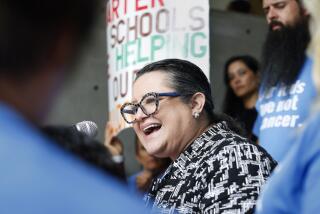Charter Schools’ Success Elusive, Study Says
- Share via
After a decade of experimentation and hundreds of studies, conclusive evidence of the relative merit or harm of giving parents more publicly financed school choices for their children remains elusive, a new Rand Corp. study concludes.
The 233-page study, released Thursday in Washington, offers some ammunition to both critics and proponents of using alternatives to traditional public schools as levers for reform. Just as with public schools in general, the effectiveness of charter schools and voucher programs depends on the type of school or program and, to some degree, the population they serve.
But researchers also conclude there’s little evidence that the rapid spread of school choice is harming traditional public schools, as predicted by critics.
“The positives seem to be small and the negatives seem to be small,” said Dominic J. Brewer, one of the authors of the analysis. “I wouldn’t go to a huge system of choice on the basis of the evidence but I also wouldn’t stop some additional experimentation. The only way we’re going to learn more is if we go forward . . . in a careful and planned way.”
The study comes as the Bush administration launches a major push to expand the number of charter schools beyond the 2,400 currently operating, and as the U.S. Supreme Court prepares to hear a case challenging the constitutionality of a voucher program in Cleveland.
First launched in Minnesota in 1991, charter schools have now spread nationally. Such schools use public dollars but operate largely independent of local school bureaucracies, which advocates say makes them more efficient and responsive to parents. The administration wants Congress to allocate $200 million to add 700 charter schools and assist 1,000 existing ones. It also is seeking $175 million to help such schools with their costs.
The administration also has offered a legal brief in favor of a voucher program in Cleveland that will be reviewed early next year by the U.S. Supreme Court. Publicly funded voucher programs, which underwrite private school tuition, serve about 17,500 students in Milwaukee, Cleveland and Florida.
“The kind of investment we’re making in options for parents and in charter schools is going to yield the type of data they’re looking for,” said Lindsey Kozberg, the spokeswoman for the U.S. Department of Education. “Our belief is that the more options you offer parents, especially parents whose kids are being raised in disadvantaged circumstances, the better off they’re going to be and the system is going to be.”
But a coalition of public school advocates, unions and liberal political groups had a different take on the meaning of the study.
“Given the current emphasis on scientifically based, research-proven education programs, the RAND study should put an end to initiatives for federal funding of these experiments” involving vouchers, said Susan Nogan, a PTA lobbyist and the chairwoman of the National Coalition for Public Education.
“Although it remains to be seen whether the United States Supreme Court will find vouchers unconstitutional, the fact that vouchers are bad public policy has not changed,” she said.
Jeanne Allen, director of the pro-choice Center for Education Reform, praised the RAND study for its objectivity. “They don’t seem to be stuck in [the] role of a lot of researchers, that they have to take a side or that their job is to dismiss reform.”
Although dozens of studies have been done of the effect on academics of charter schools and voucher programs, few met the authors’ standards for technical rigor. The studies that did suggest a modest benefit of voucher programs targeted at poor children, but only for African American students.
Only three studies of charter schools met the authors’ standards of quality. None, they write, “suggests that charter-school achievement outcomes are dramatically better or worse on average than those of conventional schools.”
In any case, test scores may not be the benchmark by which parents judge such schools or programs, said Henry Levin, who heads the National Center for the Study of Privatization in Education in New York. “They want to make sure their kids are happy, secure and safe and that the schools reflect some of their values,” he said.
More to Read
Sign up for Essential California
The most important California stories and recommendations in your inbox every morning.
You may occasionally receive promotional content from the Los Angeles Times.













